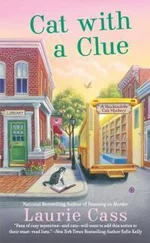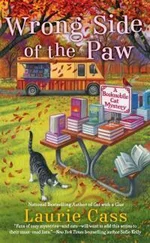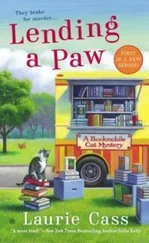The counter guy smirked. “Maybe he’s got early Alzheimer’s or something. Maybe he got lost getting back to your rig.”
I started to say that was ridiculous, but I stopped myself before getting further than “That’s ridic—” Because maybe it wasn’t. After all, I hardly knew the man. You’d have thought Denise would have said something if Roger had that sort of issue, but who knew?
“Thanks,” I said, and headed back out into the cold, snowy world. “Now what?” I muttered. Well, first thing was to make sure Roger wasn’t standing outside the locked bookmobile, waiting for me.
I hurried back around the way I’m come, but there was no Roger. I did see Eddie pawing at the windshield, so I gave him a friendly wave and, suddenly hurrying, kept going around to check the other side of the building. If Roger had been struck down by a heart attack and I’d done nothing but dawdle, I’d never forgive myself.
A wide variety of possibilities suddenly popped into my brain, and none of them was good.
Stroke.
Brain aneurism.
He fell on an icy spot and whacked his head.
He fell and broke a leg or a hip or an ankle or wrist, or any combination thereof.
An icicle fell off the roof and hit him in the head.
I swallowed and went even faster. Why hadn’t I thought about any of these things earlier when I was messing around with Eddie, waiting? With the bookmobile’s engine running, I wouldn’t have heard any calls for help. I should have paid more attention to the time. I should have paid more attention to the potential dangers. I should have done everything differently. Why had I been so complacent? Why had I assumed that everything was fine?
All this went through my mind in a flash. I broke into a run and rounded the corner of the building, breathless with worry, because I knew with a sick and sudden certainty that something was deeply wrong.
Fast as I could, I ran through the snow, dodging around the back of the tall wood fence that screened the Dumpster, hoping to see Roger standing there, talking on his cell phone to a buddy about hunting, having lost all track of time.
But there was a primal part of me that knew there would be no easy explanation.
So when I saw a man lying on the ground, I was almost expecting it. When I recognized Roger’s jeans, work boots, and canvas jacket, I was almost prepared. When I saw that he wasn’t talking, wasn’t moving, wasn’t doing anything, I was almost ready to accept that something horrible had happened.
Almost.
“Roger!” I rushed to his side and dropped to my knees in the snow. “Roger, what’s wrong? Are you okay?”
But in spite of all my fears and all my mental preparations, I wasn’t anywhere near ready for the vast spread of crimson that stained the left side of his jacket.
And I could never have prepared myself for his open eyes, staring sightlessly at the gray sky.
In a flurry, I yanked off my gloves, felt for a pulse at his neck, pulled my cell phone out of my pocket, and pushed those three short numbers that could sometimes help, that could sometimes make all the difference.
But I knew nothing was going to help Roger.
He was dead.
Chapter 4
Many, many hours later, I knocked on the door of a condominium in Charlevoix, a small town in the next county. It was a very quiet knock, one that lacked energy or interest or much of anything except an overwhelming sense of fatigue.
Tucker opened the door. He was barefoot and dressed in his typical posthospital wear of jeans and a black zip sweatshirt. “Minnie. I wasn’t sure if I heard you or not.” He stood aside. “Come on in.”
“Can I . . . ?” I paused, not sure what I wanted, not sure I had the strength to move.
“What?”
“Can I have a hug?”
Then he looked at me. Really looked at me. I don’t know what he saw—if it was my red-rimmed eyes or the fatigue that drooped at my shoulders or what must be my woebegone face—because he immediately swept me inside, shut the door, put his arms around me, and embraced me fully and completely.
I clung to him, needing his strength, needing his comfort, wanting him to make everything better. Which he couldn’t do, of course, but maybe he could keep the sadness at bay for a little while.
He released me and kissed the top of my head. “Any better?”
Sniffing, I nodded. “A little.” Sniff . “Thanks.”
“Let me take your coat.” He unzipped it and turned me around, then pulled on the cuffs, de-coating me fast and easy.
As he hung it on the coat tree, he said, “I’m guessing you need a couple of things.” He held up one finger. “Food.” He held up another finger. “A nice, long talk. You go get settled,” he said, gesturing toward his living room. “I’ll order the pizza. Mushroom and sausage on your side?”
When I nodded, he picked up the phone and started to order.
I shuffled over to the beige couch and flopped down, exhaustion dragging at me. In the months I’d been visiting Tucker in his condo, I don’t think I’d once sat down before standing at the window for a few minutes, enjoying the view of the channel that connected Charlevoix’s Round Lake to Lake Michigan, but today I couldn’t bring myself to stand any longer than I had to. Self-preservation, really, because it was only sensible to sit before I fell down.
“Now.” Tucker sat down in a leather chair that matched the couch. “Talk to me.”
I wanted to protest, to say that what I wanted most was just to have him hold me, but held back. He was probably right. If we snuggled, I might break down into a bucket of tears. What I really needed was to talk, and I could do that best if he wasn’t within arm’s length.
“Okay.” The word came out so slowly, it was almost pitiful. I told myself to buck up, and, according to my mother, the best way to start feeling better was to sit up straight and put your shoulders back.
So I did.
“Okay,” I said again, and felt my spirits rise. Not by much, but anything was good. Once again, Mom was right, and maybe one day I’d call and tell her so. Not today, though. Monday, maybe. Or Tuesday.
“Okay,” I said, this time with feeling. Only . . . I wasn’t quite ready to talk.
I let my gaze wander around the room. Beige furniture, hotel room–quality art on the walls, and bland carpet. The only Tucker-type things in the room were the bookshelves he’d bought and the books he’d filled them with. Knowing he’d be too busy at the hospital to equip even a small house properly, he’d leased a furnished two-bedroom condominium. It was nice enough, but no more than that. A wise choice for a busy bachelor, I supposed, but there was no life in the room, and I suddenly couldn’t bear it.
I stood and went to the window. The sun had set long ago, but evenly spaced lights illuminated the wide walkway that ran adjacent to the river channel, all the way out to the pier. While I couldn’t see the lighthouse itself, I could see the reflection of its circling light on the water. Around and around and around and . . .
“Minnie?” Tucker asked gently. “What’s the matter?”
And, just like that, I was ready to talk.
I told him about what had happened that day. Told him about Roger. “He was dead,” I said quietly, watching the water ripple in the glow from the lights. “I called nine-one-one, but I knew he was dead before they showed up.” There had been no chance he’d still been alive. Not with no pulse, not with his skin growing so terribly cold.
“He’d been bleeding?” my doctor boyfriend asked.
I laid a hand flat against the left side of my chest. Over my heart. “Yes,” I whispered.
Tucker stirred, and I figured he wanted to ask medical questions, but there was no way I’d be able to answer them. “The ambulance came and took him to the Petoskey hospital,” I said. “A sheriff’s deputy came out, but there wasn’t much I could tell him.” There hadn’t been much to tell my boss, either, though I’d dutifully called Stephen and told him what had happened.
Читать дальше












